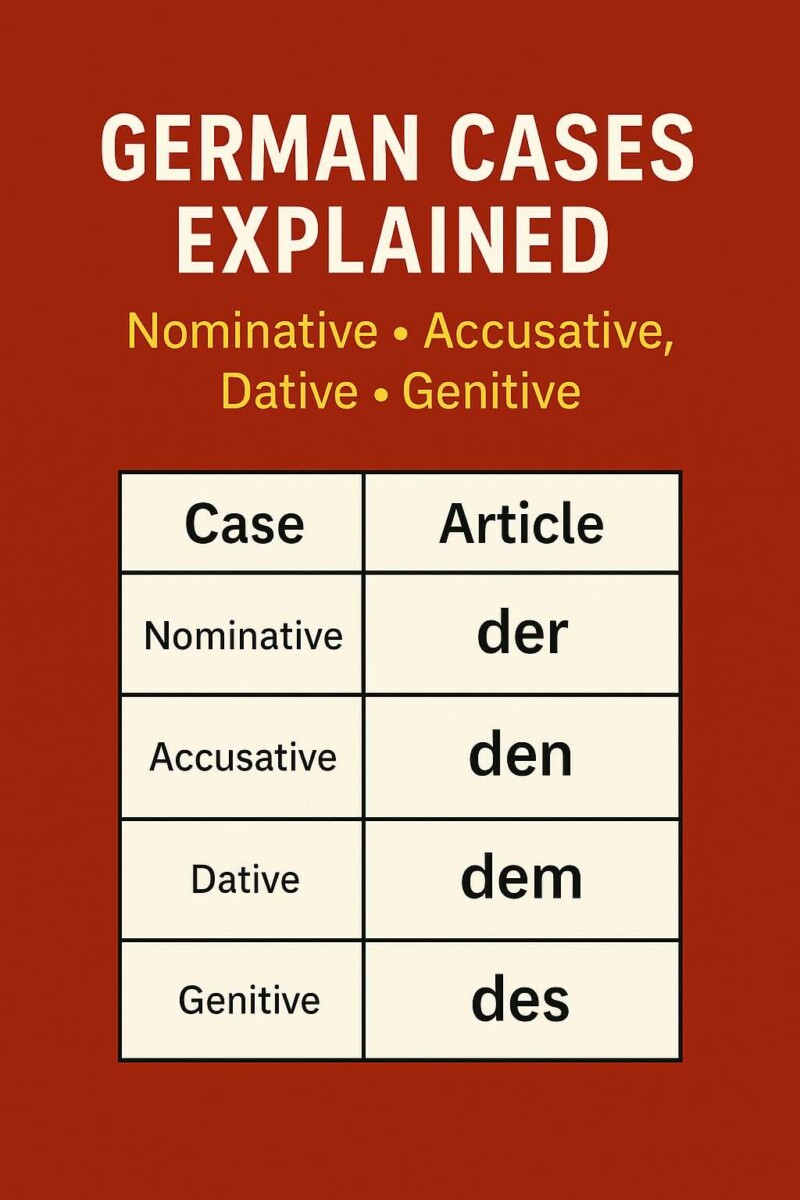🔗 选择语言
German grammar is famous for its four cases. At first, they may look scary — but once you understand the system, cases make perfect sense. This guide explains the basics of the nominative, accusative, dative, and genitive with clear rules and examples.
What Are Cases in German?
Cases show the role of a noun in a sentence. In English, word order usually tells us who does what. In German, cases do this job.
- Nominative → the subject (who/what is doing something).
- Accusative → the direct object (who/what is affected).
- Dative → the indirect object (to/for whom something happens).
- Genitive → possession (whose).
Case Endings with Articles
| Case | Masculine | Feminine | Neuter | Plural |
|---|---|---|---|---|
| Nominative | der | die | das | die |
| Accusative | den | die | das | die |
| Dative | dem | der | dem | den |
| Genitive | des | der | des | der |
Nominative Case: The Subject
Used for the subject of the sentence.
例如
- Der Mann lernt Deutsch. (The man learns German.)
- Die Frau arbeitet. (The woman works.)
Accusative Case: The Direct Object
Used for the object that receives the action.
例如
- Ich sehe den Mann. (I see the man.)
- Wir kaufen das Buch. (We buy the book.)
Dative Case: The Indirect Object
Used for the person who receives something.
例如
- Ich gebe dem Kind ein Geschenk. (I give the child a present.)
- Sie schreibt der Freundin einen Brief. (She writes her friend a letter.)
Genitive Case: Possession
Shows ownership or belonging.
例如
- Das ist das Auto des Lehrers. (That is the teacher’s car.)
- Die Tasche der Frau ist schön. (The woman’s bag is nice.)
Common Mistakes — and How to Fix Them
- ❌ Ich sehe der Mann.
✔️ Ich sehe den Mann. (accusative needed) - ❌ Ich gebe das Kind ein Buch.
✔️ Ich gebe dem Kind ein Buch. (dative needed) - ❌ Das ist das Auto der Lehrer. (plural instead of genitive)
✔️ Das ist das Auto des Lehrers.
FAQ: German Cases
Q: Which case should I learn first?
Start with nominative and accusative — they are used in most sentences.
Q: Is genitive still common?
Less in spoken German, often replaced by dative, but still important in writing.
Q: How can I practice cases?
Learn nouns with their articles and make short example sentences.
Final Note
German cases are not random — they make sentences precise and clear. Once you know the basic rules, you will see patterns everywhere.
👉 For a deeper reflection on how grammar shapes thinking, see Tymur Levitin’s Author’s Column.

📚 Related Articles
- German Word Order: The Ultimate Guide for Beginners
- 10 Common German Grammar Mistakes and How to Avoid Them
👨🏫 作者: Tymur Levitin — founder, director, and senior teacher at Levitin Language School | Start Language School by Tymur Levitin.
View teacher’s profile →
🌍 Learn German with us:
German Language Learning Page →
© Tymur Levitin | Category: German Grammar for Beginners
























